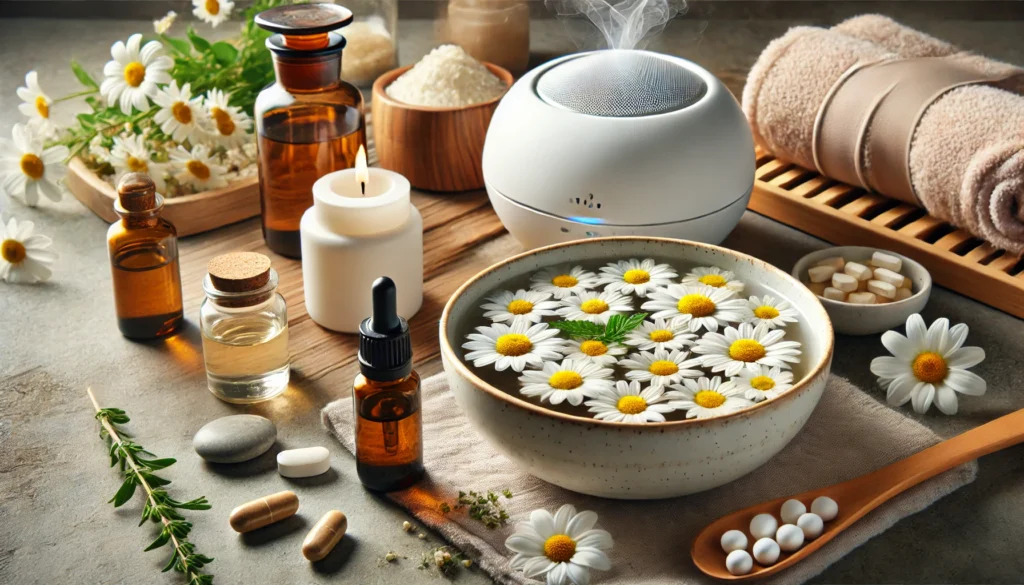Understanding the Need for Natural Anxiety Relief
In an age where anxiety disorders have become one of the most common mental health challenges worldwide, many individuals are reevaluating their reliance on prescription medications. While pharmaceutical interventions like Xanax (alprazolam) offer fast-acting relief for acute anxiety and panic attacks, they also carry risks—addiction, dependence, withdrawal symptoms, and cognitive impairment among them. For this reason, there has been a growing demand for a natural replacement for Xanax that offers calming effects without the side effects or dependency issues. The conversation has shifted toward holistic, herbal solutions that tap into the body’s innate ability to restore balance through adaptogenic herbs and natural anxiolytics.
You may also like: Exploring Natural SSRI Alternatives: Herbal Remedies for Anxiety and Mood Support
Increasingly, people are turning to natural xanax alternatives that support the nervous system gently yet effectively. These include time-tested herbal remedies from Ayurveda, Traditional Chinese Medicine, and modern clinical research. As awareness about these options spreads, a new wellness narrative is emerging—one that favors natural healing, long-term regulation of stress, and sustainable mental health. This article explores the most promising natural alternatives to Xanax and similar benzodiazepines, providing evidence-backed insights for those seeking safer over-the-counter anxiety relief.

The Downsides of Benzodiazepines and the Search for Better Options
Xanax is a widely prescribed benzodiazepine for anxiety and panic disorders. However, it works by enhancing GABA activity in the brain, which can lead to sedation, dependency, and withdrawal symptoms even with short-term use. Many patients who use it long-term find themselves needing higher doses to maintain effectiveness—a phenomenon known as tolerance. Furthermore, abrupt cessation can result in severe rebound anxiety, insomnia, and in extreme cases, seizures.
For those reasons, healthcare professionals are increasingly recommending that patients explore a natural replacement for clonazepam and other similar drugs. There is growing recognition that chronic stress and anxiety require sustainable lifestyle changes, not just pharmaceutical quick fixes. With this mindset shift, natural alternatives to Xanax are not only gaining popularity among users but also among clinicians seeking integrative solutions. These herbal and nutritional therapies provide gradual yet enduring results without compromising cognitive function or emotional stability.

What Makes an Effective Over the Counter Xanax Alternative?
An ideal natural Xanax substitute should act on the nervous system in a way that calms anxiety without impairing alertness. Most effective options either enhance GABA activity naturally or modulate cortisol levels through adaptogenic mechanisms. For example, herbs like ashwagandha, passionflower, and valerian root are known to promote tranquility and ease nervous tension. These ingredients, often found in natural xanax pills or liquid tinctures, have been used for centuries to support emotional balance.
Over the counter Xanax alternatives are typically composed of standardized herbal extracts, amino acids like L-theanine, or minerals like magnesium. These compounds do not cause the same sedative effects as benzodiazepines but help stabilize mood and sleep patterns over time. Additionally, a natural equivalent to Valium or Xanax may offer cognitive benefits, improved resilience to stress, and fewer negative side effects. Choosing the best herbal Xanax option often involves trial and error, but the results can be profoundly positive when the right supplement is matched to the individual’s needs.

Herbal Xanax: Key Adaptogens and Botanicals for Anxiety
One of the most promising natural alternatives to Xanax is the class of herbs known as adaptogens. These botanicals help the body adapt to stressors by regulating the hypothalamic-pituitary-adrenal (HPA) axis and reducing excessive cortisol production. Ashwagandha, for example, is considered a natural valium substitute due to its ability to lower stress and improve sleep quality. Clinical studies have shown that ashwagandha supplementation can significantly reduce symptoms of generalized anxiety disorder.
Another potent herb is passionflower (Passiflora incarnata), often featured in herbal xanax formulas for its calming, non-sedative properties. Passionflower appears to work by increasing GABA levels naturally, resulting in relaxed yet clear-headed mental states. Valerian root is also commonly used as a natural alternative to Valium and clonazepam due to its mild tranquilizing effects. It’s especially beneficial for individuals experiencing anxiety-related insomnia. For those wondering what is a good natural substitute for Ativan, these herbs offer a solid foundation for building an effective daily regimen.
Natural Supplements That Act Like Xanax Without the Risks
While herbs play a central role in natural anxiety relief, nutritional supplements also contribute significantly. Magnesium, particularly in the glycinate or threonate forms, helps calm the nervous system by regulating NMDA receptors and supporting GABA synthesis. L-theanine, an amino acid found in green tea, promotes alpha brain wave activity and is often included in otc xanax formulations for its ability to induce calm focus.
GABA supplements themselves may also serve as an over the counter Xanax substitute, though their efficacy depends on whether they cross the blood-brain barrier. To enhance absorption, some products pair GABA with compounds like niacin or phosphatidylserine. These natural xanax pills may be sold under brand names or in custom blends from holistic supplement companies. Many users report noticeable reductions in anxiety without the mental fog or drowsiness associated with pharmaceuticals.
How to Choose the Best OTC Similar to Xanax Product
When choosing an otc similar to Xanax remedy, it’s essential to consider the individual’s underlying symptoms. Is the anxiety primarily mental, or does it manifest physically through restlessness, racing heart, or panic attacks? Tailoring the supplement to one’s unique stress profile is key. For example, someone experiencing adrenal fatigue might benefit more from rhodiola or reishi mushroom, while someone with intrusive thoughts might respond better to lemon balm or lavender extract.
Formulation quality is another important factor. Look for third-party-tested products that use standardized extracts, clearly list active ingredients, and avoid unnecessary fillers. The best over the counter xanax alternatives will also include synergistic blends of herbs, minerals, and amino acids to optimize results. Some of the most respected brands in the holistic supplement space have developed proprietary formulas that support calm energy, mental clarity, and emotional resilience.
Comparing Herbal Xanax to Prescription Medication
Natural alternatives to Xanax are not intended to replace medical treatment in cases of severe anxiety or panic disorders. However, they can serve as effective adjuncts or as long-term strategies for managing subclinical anxiety. Herbal Xanax blends may take longer to show effects than pharmaceutical drugs, but their impact is often more sustainable. Moreover, they support mental health holistically by nourishing the nervous system, rather than suppressing symptoms temporarily.
Natural xanax pills also offer the advantage of being non-addictive and safe for most people when taken as directed. Unlike benzodiazepines, they do not lead to tolerance or require increasing dosages over time. For those looking for a natural substitute for clonazepam or Ativan, the right botanical or supplement may offer meaningful relief with fewer risks. As more research validates these therapies, the medical community is beginning to recognize their value as part of a well-rounded mental health protocol.
Integrating Lifestyle Practices with Natural Xanax Alternatives
While herbal supplements and otc xanax alternatives can be powerful tools, their effectiveness increases when combined with supportive lifestyle practices. Mind-body techniques such as mindfulness meditation, breathwork, yoga, and progressive muscle relaxation can enhance the effects of herbal Xanax remedies. These practices work synergistically with adaptogens to regulate the stress response and improve emotional regulation.
Nutrition also plays a pivotal role. A diet rich in omega-3 fatty acids, B-complex vitamins, and antioxidant-rich fruits and vegetables supports the biochemical pathways involved in mood regulation. Reducing caffeine, sugar, and alcohol can further stabilize mood and decrease anxiety. Incorporating daily movement, quality sleep, and regular exposure to nature also supports long-term nervous system health, complementing the benefits of a natural replacement for Xanax.
Who Should Consider Natural Xanax Pills or Supplements?
Individuals with mild to moderate anxiety, stress-related symptoms, or those weaning off benzodiazepines under medical supervision are ideal candidates for natural xanax alternatives. People sensitive to pharmaceuticals or those with concerns about addiction may find these options particularly appealing. Natural replacements for clonazepam and similar medications can provide a sense of calm without altering cognition or impairing daily function.
It’s always best to consult a qualified healthcare provider before starting any supplement, especially if you are currently on medication or have a chronic health condition. Some herbs may interact with prescription drugs or have contraindications based on individual biochemistry. However, for many individuals, transitioning to a herbal alternative to Valium or Xanax opens the door to greater autonomy in mental health care and a more balanced approach to managing stress.
Frequently Asked Questions: Natural and OTC Alternatives to Xanax, Ativan, and Valium
1. What are the most effective herbal options as a natural replacement for Xanax?
Some of the most promising herbal remedies for anxiety management include passionflower, lemon balm, and kava root. Each has shown anxiolytic effects in clinical trials, offering calming properties without the sedation associated with pharmaceuticals. These botanicals are often used as a natural replacement for Xanax due to their impact on GABA receptors, similar to benzodiazepines. However, it’s essential to monitor dosage and consult with a healthcare provider, especially if you’re already taking medications. Herbal xanax formulations typically combine several herbs to create synergistic effects, improving their efficacy as a natural xanax substitute.
2. Is there an over the counter Xanax alternative that provides fast-acting relief?
Yes, certain OTC supplements like L-theanine, magnesium glycinate, and GABA are increasingly used as a fast-acting over the counter Xanax alternative. These compounds support neurotransmitter regulation and nervous system balance. While not as immediate in onset as Xanax, some users report perceptible relaxation within 30–60 minutes. OTC xanax options may also include adaptogenic herbs like ashwagandha, which help modulate cortisol response during acute stress. If you’re seeking a xanax substitute OTC, combining fast-acting amino acids with longer-term adaptogens can be a strategic solution.
3. What is a good natural substitute for Ativan that works without sedation?
Ashwagandha and rhodiola rosea have emerged as leading candidates when asking what is a good natural substitute for Ativan. These herbs don’t typically cause drowsiness and are suitable for daytime use, which makes them a practical natural alternative to traditional benzodiazepines. They work by reducing overactivity in the HPA (hypothalamic-pituitary-adrenal) axis, which plays a central role in stress response. For those who need mental clarity while managing anxiety, these herbs serve as a natural replacement for clonazepam or Ativan with fewer cognitive side effects. You’ll often find them in formulas marketed as a natural xanax or herbal xanax.
4. How effective is a natural valium substitute compared to prescription options?
A natural valium substitute is unlikely to offer the identical sedative strength of diazepam, but it can still be effective for mild to moderate anxiety. Valerian root and chamomile are two botanical compounds with robust clinical support for their calming properties. Many people find these herbs useful when tapering off benzodiazepines or seeking non-habit-forming options. A natural equivalent to valium may also include combinations of calming herbs, magnesium, and amino acids to mimic the multifaceted action of prescription drugs. For those seeking a holistic route, a natural alternative to valium provides a safer long-term approach to nervous system support.
5. Can natural xanax pills help with panic attacks?
Natural xanax pills often include concentrated extracts of passionflower, GABA, and valerian to support acute anxiety. While they may not match the speed or potency of a pharmaceutical, they can be helpful in managing early signs of panic attacks. These formulations often avoid synthetic sedatives and focus on nervous system support through natural pathways. They are increasingly being used as a xanax substitute OTC, especially among individuals looking to avoid dependency. If panic is recurring, pairing a natural substitute for xanax with cognitive-behavioral therapy (CBT) may improve outcomes significantly.
6. Are there over the counter medications similar to Xanax for nighttime anxiety?
Yes, many OTC options focus on sleep and anxiety overlap, such as melatonin combined with calming herbs. Products labeled as OTC similar to Xanax often target both stress and insomnia, using ingredients like 5-HTP and valerian root. These are ideal for individuals experiencing racing thoughts or difficulty falling asleep. Over the counter xanax alternatives geared toward nighttime use should be non-habit-forming and gentle enough to avoid grogginess the next day. As part of your nighttime routine, natural xanax pills can offer relief when pharmaceutical access is limited or undesired.
7. How do natural alternatives to Xanax support long-term stress resilience?
Unlike fast-acting drugs, natural alternatives to Xanax often take a cumulative approach, strengthening the body’s stress response over time. Adaptogens like holy basil and bacopa monnieri help regulate cortisol, the primary stress hormone, reducing overall anxiety. These herbs are typically found in products marketed as a natural xanax or herbal xanax, aiming to support emotional balance over weeks rather than minutes. Incorporating mindfulness practices, exercise, and dietary changes enhances the effectiveness of a natural xanax substitute. The goal is not just symptom relief but building true resilience and emotional flexibility.
8. Is there a natural replacement for clonazepam that can be used daily?
Many people turn to lemon balm, magnesium, and L-theanine as a daily-use natural replacement for clonazepam. These ingredients promote calm without impairing cognitive function, making them viable for long-term management. Some OTC combinations include these as part of a broader formulation advertised as a natural alternative to valium or a herbal alternative to valium. When considering a natural substitute for clonazepam, it’s important to ensure the product has clinical backing and transparent labeling. Daily use requires consistency and a clear understanding of your unique neurological needs.
9. What’s the difference between herbal xanax and a natural xanax supplement?
Herbal xanax usually refers to plant-based ingredients alone, such as passionflower, valerian, and lavender, often used in tea or capsule form. A natural xanax supplement may include these herbs along with vitamins like B6, magnesium, and amino acids like L-theanine, offering a more comprehensive approach. Both can function as a natural replacement for Xanax, but the broader ingredient profile in supplements often enhances effectiveness. Some users find herbal alternatives work best as needed, while others take daily natural xanax pills for ongoing support. The best choice often depends on your anxiety triggers, severity, and lifestyle.
10. How do I know if a product is a reliable natural substitute for Xanax?
The best natural substitute for Xanax will have clinically validated ingredients, transparent labeling, and preferably third-party testing. Avoid blends with vague “proprietary formulas” that don’t disclose dosages. Look for established herbs and nutrients known for nervous system support and backed by research. Whether you’re evaluating a natural valium substitute, a xanax substitute OTC, or an over the counter xanax alternative, choose reputable brands with published safety profiles. When in doubt, consult a healthcare provider knowledgeable in integrative or functional medicine to tailor the most effective herbal solution to your needs.
Final Thoughts: Embracing Safer, Natural Paths to Peace of Mind
The search for a safe, sustainable, and effective natural replacement for Xanax reflects a larger cultural shift toward empowered, integrative health care. People are no longer willing to accept side effects and long-term dependency as the price for symptom relief. With the right combination of herbal support, nutritional balance, and lifestyle alignment, it is possible to reduce anxiety naturally, without sacrificing mental clarity or emotional well-being.
As research continues to explore the efficacy of these remedies, the case for natural xanax alternatives becomes stronger. Whether you’re seeking a natural substitute for clonazepam, a non-prescription answer to occasional panic attacks, or an herbal tool to enhance your meditation practice, there is a wealth of safe and effective options available. These solutions not only support the nervous system but also honor the body’s natural intelligence in healing from within. In this way, the path to inner peace becomes not just a treatment protocol, but a lifestyle rooted in balance, resilience, and self-awareness.
anxiety calming techniques, adaptogenic herbs for stress, natural sleep aids, herbs for nervous system support, holistic mental health, GABA boosting supplements, emotional regulation naturally, stress reducing botanicals, alternatives to benzodiazepines, calming adaptogens, mindfulness for anxiety, mood balancing herbs, herbal treatments for panic attacks, stress management supplements, herbal relaxation remedies, brain health and anxiety, herbal mood enhancers, integrative approaches to anxiety, natural serotonin boosters, non-habit forming anxiety relief
Further Reading:
6 natural antidepressants: Are they effective?
Trazodone alternatives: What can I take instead of trazodone?
Alternative remedies for insomnia: a proposed method for personalized therapeutic trials
The information contained in this article is provided for general informational purposes only and is not intended to serve as medical, legal, or professional advice. While NewsHealthWatch strives to present accurate, up-to-date, and reliable content, no warranty or guarantee, expressed or implied, is made regarding the completeness, accuracy, or adequacy of the information provided. Readers are strongly advised to seek the guidance of a qualified healthcare provider or other relevant professionals before acting on any information contained in this article. NewsHealthWatch, its authors, editors, and contributors expressly disclaim any liability for any damages, losses, or consequences arising directly or indirectly from the use, interpretation, or reliance on any information presented herein. The views and opinions expressed in this article are those of the author(s) and do not necessarily reflect the official policies or positions of NewsHealthWatch.

